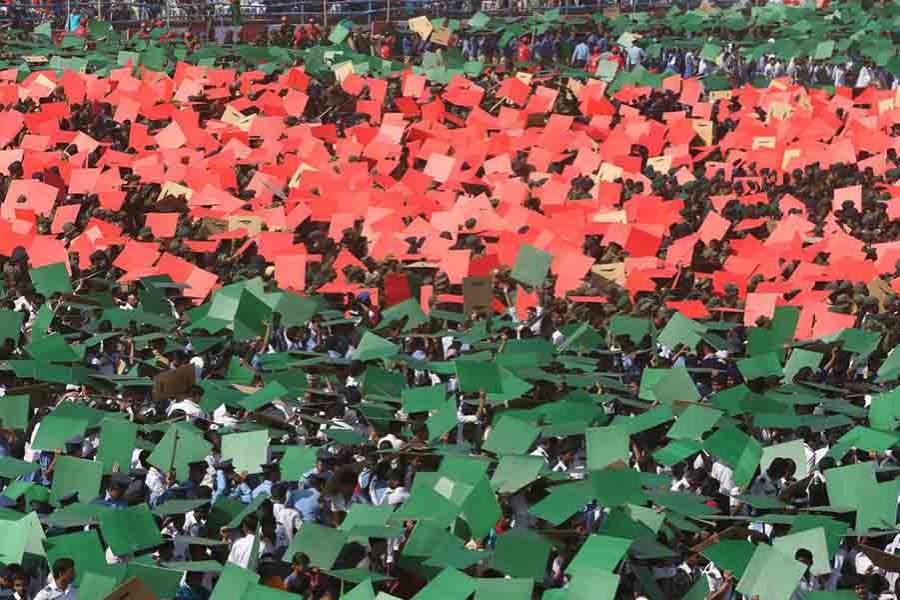Bliss it was in that dawn to be alive
But to be young was very heaven.
This is how William Wordsworth paid his tribute to the French Revolution. If allowed the liberty of doing small changes to the famous quotation like this: 'Blessed one was in that dawn to be alive/But to be a freedom fighter was seven heavens', it fits into the Bangladesh context.
Indeed, no day can match the feeling of joy and relief the Bangalees experienced on December 16 when the Pakistani army formally surrendered to the joint command of Indian and Bangladesh forces at the Suhrwardy Uddyan. With the surrender of the occupation forces, history was rewritten for a people that came through one of the darkest chapters of subjugation, mass killing, torture and sexual violence. For long nine months, the Bangalees either lived the life of prisoners in their own homes or were forced to leave the country and become refugees in Indian camps.
In a war ravaged country, the dawning of December 16 brought an end to the imposed war and the massacre of the people on their own soil. It is because of this the triumph in the war was so sweet. The nation celebrates the March 26 as its Independence Day. But it had to win the war first to materialise full independence. First, it was an unequal war between the Pakistani regular army and freedom fighters who received short training before confronting the enemy. Poorly equipped and inadequately trained the freedom fighters were no match for their adversaries in frontal confrontation. But with support from local people, the freedom fighters adopted guerrilla tactics in order to get the better of the Pakistani forces.
It worked. The invading Pakistani soldiers were demoralised soon. Their moral aberration and involvement in all types of crimes against the civilian population here gradually weakened them. On the other hand, the freedom fighters were fighting for survival, freedom from subjugation, for liberation of their motherland. They were ready to sacrifice their lives for a cause. Their lack of arms and ammunition, uniform, training and experience did not stand in their way of taking the fight to the Pakistani marauding forces.
On that count, it was a victory of elevating spirit over the baser instincts, of the mind over the mundane. True, the involvement of the friendly Indian army made short work of the armed engagement. But by that time, the occupation Pakistani military became morally bankrupt. A final push brought the occupation forces down to the dust. Independence took its concrete shape through the victory. But it was a victory that was achieved at a high price. As many as 3.0 million people perished in the bloody war the Pakistanis started and during the period 0.3 million women and girls were dishonoured.
So when the moment of victory arrived, it was unlike any in the history of the Bangalees. For many it was to see this happen to believe. It was the triumph of the Bangalee ethos ignited and illuminated so bright that the brute and evil forces had to capitulate to it. This victory has brought them their freedom of living a life of their own. No wonder that Bangladesh has started doing better than Pakistan in terms of most of the human indices within decades of parting ways.
Thus the country has proved to the outside world that the victory it achieved almost five decades ago is worth celebrating. Here is a people that has a rich history of living in peace and a heritage of contributing to the world's treasure trove of knowledge. Now the challenge is to distribute the fruits of independence equitably to all people irrespective of their social status. The victory earned against a formidable foe in 1971 leaves the legacy of achieving yet another victory over the rapaciousness of a section of people who have scant regard for the Liberation War.
It was a war that brought all people on the same plane. Similarly, a national solidarity built on the principles of equality and fraternity of all people should have prevailed for inclusive development. Unfortunately, such a dream as dreamt by the martyred and still alive freedom fighters has not materialised. Had it been the case, news such as freedom fighter begging or paddling rickshaws for a livelihood would not make screaming headlines. The irony is that even after publication of such news the economic condition of those freedom fighters has not changed.
Here is where victory has failed to make a bold statement for the nation. A people that can defeat a brutal army from Pakistan certainly has the moral obligation to rise over petty things and be generous enough to score yet another victory where simple material gains are concerned. Sharing material prosperity, however, demands supporting political and social programmes. Most members of the privileged and influential segment of society today find the ideals and spirit of the Liberation War fade in the distant horizon. It is exactly here, reviewing of the socio-political programmes is highly essential.
This year the preparation for celebration of the Victory Day seems to be on a subdued note. True, the ritualistic celebration is not all. But there is no sign that the quintessence of the spirit is given a free play either.


